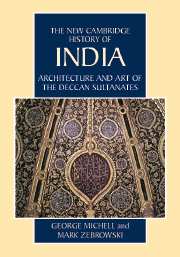Book contents
- Frontmatter
- Introduction
- 1 Historical framework
- 2 Forts and palaces
- 3 Mosques and tombs
- 4 Architectural decoration
- 5 Miniature painting: Ahmadnagar and Bijapur
- 6 Miniature painting: Golconda and other centres
- 7 Textiles, metalwork and stone objects
- 8 Temples
- 9 Conclusion
- Appendix: Dynastic Lists of Deccan Rulers
- Bibliographic Essay
- Bibliography
- Index
- Map of the Southern Deccan"
- Plate Section"
8 - Temples
Published online by Cambridge University Press: 28 March 2008
- Frontmatter
- Introduction
- 1 Historical framework
- 2 Forts and palaces
- 3 Mosques and tombs
- 4 Architectural decoration
- 5 Miniature painting: Ahmadnagar and Bijapur
- 6 Miniature painting: Golconda and other centres
- 7 Textiles, metalwork and stone objects
- 8 Temples
- 9 Conclusion
- Appendix: Dynastic Lists of Deccan Rulers
- Bibliographic Essay
- Bibliography
- Index
- Map of the Southern Deccan"
- Plate Section"
Summary
Hindu religious architecture in the Deccan was effectively brought to an end by the Delhi conquests. Temples all over the region were desecrated and destroyed, their ceremonies profoundly disrupted if not altogether extinguished. So complete was the devastation that when need arose again to build Hindu sanctuaries in the second half of the seventeenth century there was no living tradition to draw on; the immediate solution was to borrow from contemporary practice. The extent to which Maratha temples relied on Sultanate and Mughal architecture is seen in the techniques and decorative devices derived from mosques and tombs (see chapter 3). The earliest Maratha temples, such as Shivaji’s shrine at Raigad and his memorial at Sindhudurg, are built of stone and mortar, with repeated use of pointed arches as well as vaults and domes supported on pendentives and squinches. Ornamentation is generally restricted to stylised parapet elements and lotus finials. Such a dependence on techniques and features derived from mosques and tombs, whether Sultanate or Mughal, does not seem to have implied any religious associations; rather, it was merely a case of adopting traditions which lay nearest to hand.
As temple building increased in response to the expansion of Maratha power in the course of the eighteenth century, architects also took opportunities to study the remains of past traditions. The most readily available models in the Maratha heartland were the Yadava temples of the eleventh and twelfth centuries, the dilapidated remains of which were plainly visible throughout the western Deccan. No historical evidence exists to show how exactly these earlier monuments were studied; the results, however, are clear.
Information
- Type
- Chapter
- Information
- Architecture and Art of the Deccan Sultanates , pp. 246 - 267Publisher: Cambridge University PressPrint publication year: 1999
